Search results for: “small scale LNG”
-
Floating LNG: do the costs work?
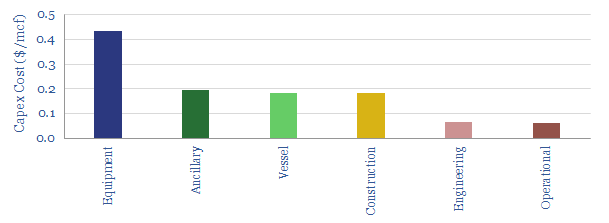
A 2.5MTpa Floating LNG vessel using the Golar/PRICO process would cost c$700/tpa, or $1.1/mcfe. A $2.5/mcf liquefaction-spread is therefore needed for a 10% return. The key economic risk is ‘uptime’. This file contains our workings; including cost-estimates across 17-categories, such as compressors, heat-exchangers, vessel-costs, et al.
-
Small-scale CCS: transport liquid CO2?
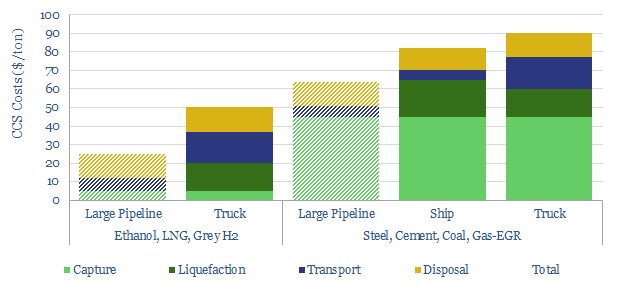
CO2 has unusual physical properties, which make small-scale liquefaction and transport much more viable than we had expected. The energy burden is 70% less than other industrial gases. Total CCS costs are $50-90/ton for leading examples. This 15-page note outlines the opportunity.
-
LNG liquefaction: what challenges and opportunities?
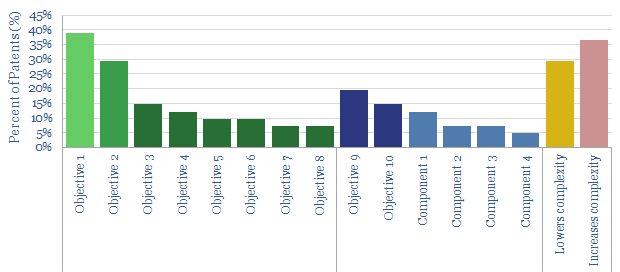
This data-file reviews 40 recent LNG patents, to draw conclusions and identify leading companies. Lowering capex costs matters, but should not be done at the expense of higher opex or emissions. The next generation of modular plants offer a step-change improvement. And new process technologies are also coming through.
-
LNG trucks: Asian equation?
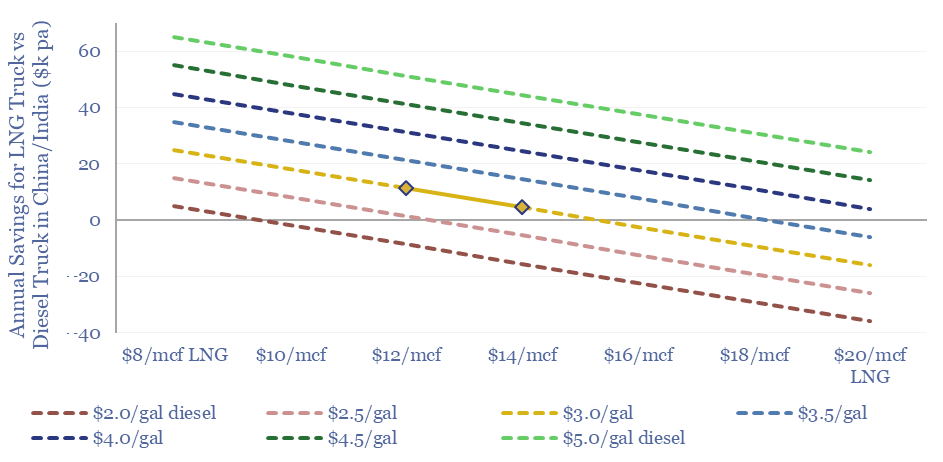
LNG trucking is more expensive than diesel trucking in the developed world. But Asian trucking markets are different, especially China, where exponentially accelerating LNG trucks will displace 150kbpd of oil demand in 2024. This 8-page note explores the costs of LNG trucking and sees 45MTpa of LNG displacing 1Mbpd of diesel?
-
Grid-scale battery costs: the economics?
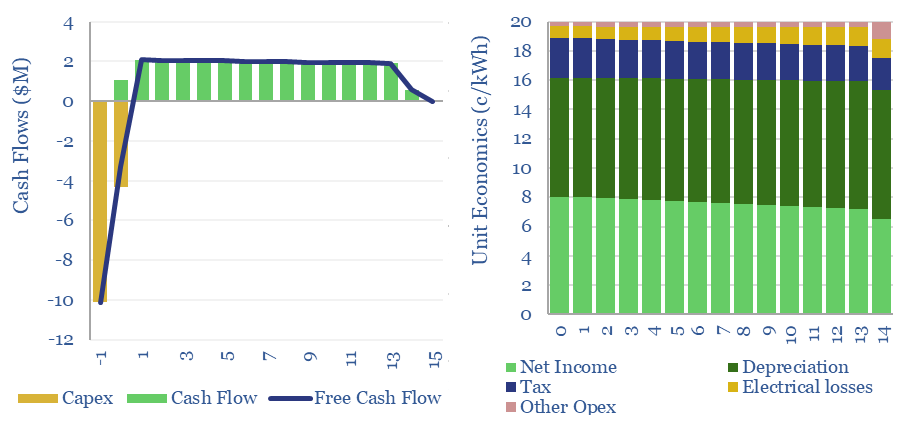
Grid-scale batteries are envisaged to store up excess renewable electricity and re-release it later. Grid-scale battery costs are modeled at 20c/kWh in our base case, which is the ‘storage spread’ that a LFP lithium ion battery must charge to earn a 10% IRR off c$1,000/kW installed capex costs. Other batteries can be compared in the…
-
Storage tank costs: storing oil, energy, water and chemicals?
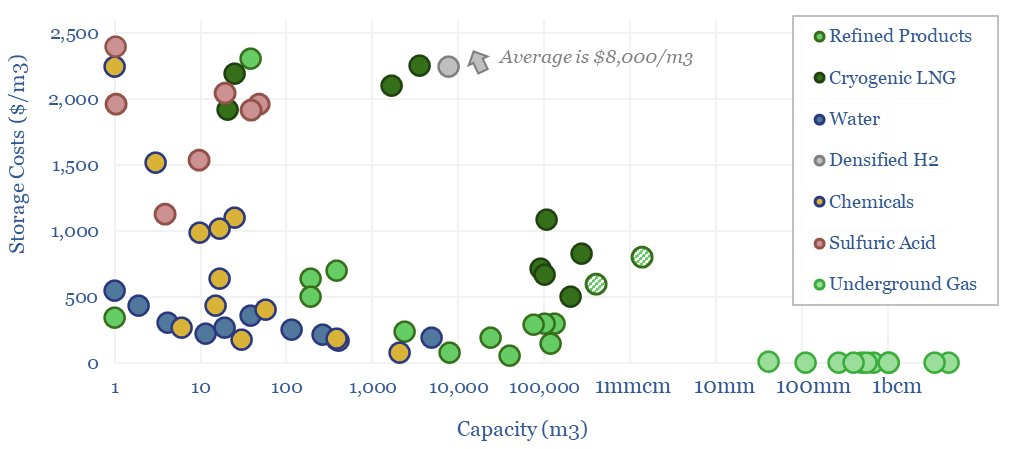
Storage tank costs are tabulated in this data-file, averaging $100-300/m3 for storage systems of 10-10,000 m3 capacity. Costs are 2-10x higher for corrosive chemicals, cryogenic storage, or very large/small storage facilities. Some rules of thumb are outlined below with underlying data available in the Excel.
-
Decarbonized gas: ship LNG out, take CO2 back?
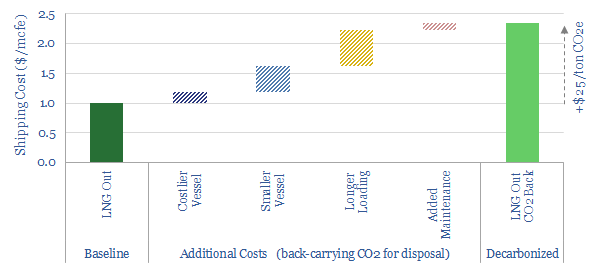
This note explores an option to decarbonize global LNG: (i) capture the CO2 from combusting natural gas (ii) liquefy it, including heat exchange with the LNG regas stream, then (iii) then send the liquid CO2 back for disposal in the return journey of the LNG tanker. There are some logistical headaches, but no technical show-stoppers.…
-
LNG plant compressors: chilling goes electric?
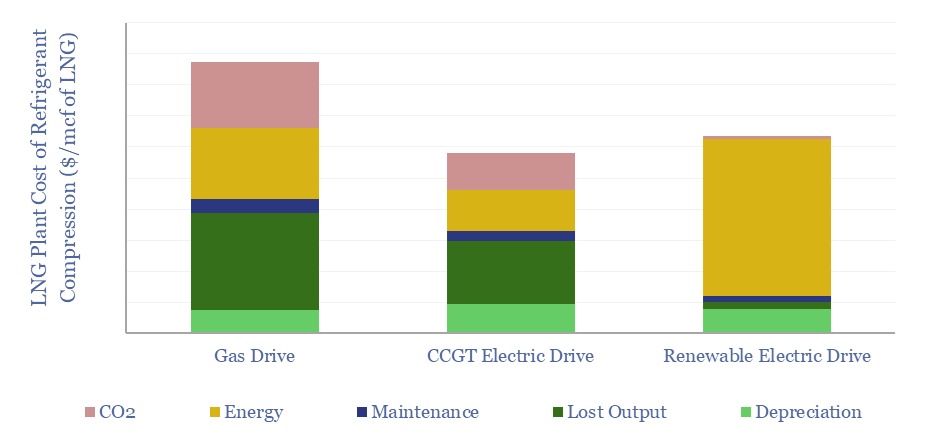
Electric motors were selected, in lieu of industry-standard gas turbines, to power the main refrigeration compressors at three of the four new LNG projects that took FID in 2024. Hence is a major change underway in the LNG industry? This 13-page report covers the costs of e-LNG, advantages and challanges, and who benfits from shifting…
-
NuScale: small modular reactor breakthrough?
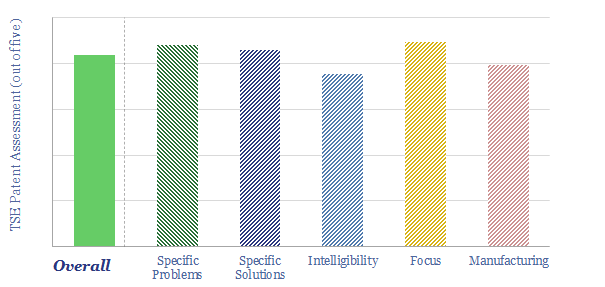
NuScale is developing a small modular nuclear reactor (SMR), producing 77MWe of power. It is the first SMR design to win US regulatory approval and the first plant is being built in Romania for 2028. NuScale’s patents scored well on our framework.
-
CO2 intensity of natural gas value chains?
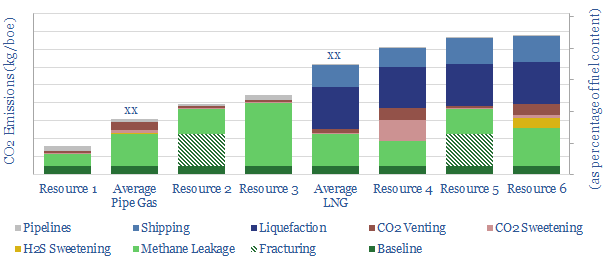
We have constructed a simple model to estimate full-cycle CO2 emissions of a gas resource, as a function of its production efficiency, contaminants (CO2 and H2S), and commercialisation (LNG or pipelines) . Compared with the life-cycle emissions of oil, CO2 per boe is seen to be c0-20% lower for LNG and c50-75% lower for piped…
Content by Category
- Batteries (89)
- Biofuels (44)
- Carbon Intensity (49)
- CCS (63)
- CO2 Removals (9)
- Coal (38)
- Company Diligence (94)
- Data Models (838)
- Decarbonization (160)
- Demand (110)
- Digital (59)
- Downstream (44)
- Economic Model (204)
- Energy Efficiency (75)
- Hydrogen (63)
- Industry Data (279)
- LNG (48)
- Materials (82)
- Metals (80)
- Midstream (43)
- Natural Gas (148)
- Nature (76)
- Nuclear (23)
- Oil (164)
- Patents (38)
- Plastics (44)
- Power Grids (130)
- Renewables (149)
- Screen (117)
- Semiconductors (32)
- Shale (51)
- Solar (68)
- Supply-Demand (45)
- Vehicles (90)
- Wind (44)
- Written Research (354)